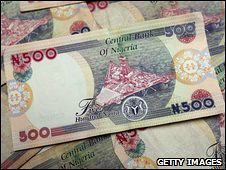
The Central Bank of Nigeria is seeking to resuce the financial sector in the oil-rich West African state. Executives of the top five banks were sacked while the suspension of trade was announced.
Originally uploaded by Pan-African News Wire File Photos
By Daniel Osunkoya
Nigeria Next
September 6, 2010 02:38AM
The Nigerian Stock Exchange recorded a total loss of N37 billion on equities at the close of trading activities in August, blaming selloffs of banks' shares on the downturn.
The market value of the 215 listed equities, which opened the month at N6.32 trillion, closed on the last trading day of August at N5.95 trillion, reflecting a N37 billion loss or a 5.9 percent decline.
Also, the NSE All-Share Index, which opened at 25,844.18 basis points, closed the month at 24,268.24, a decline of 1,575.94 units or 6.1 percent, as against the increase of 460.04 points or 1.84 percent recorded in July.
The Exchange's information department said the stock market reversed the positive gains recorded in the preceding month because there were selloffs of banks' shares following the Central Bank's directive on banks' exposure to the capital market.
"Though the selloffs were not massive, banks tried to comply with the apex bank directive to reduce their exposure to the capital market to 10 percent by September 1, 2010," it said, adding that "the market was at its five-month low as the robust liquidity position in the money market did not impact on the stock market, hence, stock prices dropped on reduced volume of transactions."
The Exchange also said, "The decline in market capitalisation in August can be attributed to the decline in the prices of most equities."
Market turnover
The market recorded a turnover of 5.3 billion shares valued at N46.91 billion in 142,594 deals during August in contrast to a total of 7.64 billion shares valued at N58.8 billion exchanged during July in 134,220 deals.
Consequently, trading volume and value dropped by 31.1 percent and 20.2 percent respectively, while the number of executed trades rose by 6.2 percent. Last month, trading volume increased by 7.5 percent while trading value and number of trades had dropped by 3.2 percent and 22.4 percent respectively.
Aggregate stock market turnover between January and August 2010 were 67.73 billion shares valued at N542.7 billion, exchanged in 1,451,295 deals. In the comparable period during 2009, the market recorded turnover of 66.22 billion shares valued at N442.7 billion in 1,247,278 deals.
Measuring by turnover volume, the banking subsector was the most active in August with traded volume of 2.74 billion shares valued at N22.82 billion, while the insurance subsector was second with traded volume of 706.2 million shares, worth N749.75 million. The food/beverages subsector was third with transaction volume of 217.13 million valued at N5.34 billion.
A total of 182 equities out of the listed 215 were traded during the month, compared with 176 in July. First Bank of Nigeria was the most active stock in August, followed by United Bank for Africa and Zenith Bank.
Bond trading
For the Over-The-Counter (OTC) bond market, a turnover of 1.003 billion units worth N1.023 trillion was recorded in August, in contrast to a total of 1.32 million shares valued at N1.45 trillion exchanged during the preceding month.
The most active bond, in terms of volume, was the 10 percent Federal Government of Nigeria (FGN) Bond July 2030 with traded volume 251.53 million units valued at N234.9 billion. It was followed by 4 percent FGN April 2015 with a traded volume of 114.9 million units valued at N95.411 billion. Only 26 of the available 37 FGN Bonds were traded during the month, compared with the 28 in July.
Between January and August, total transactions on FGN Bonds through the OTC were 10.41 billion units valued at N12.175 trillion. During the same period in 2009, total transactions on FGN Bonds through the OTC were 11.6 billion valued at N12.12 trillion.
No comments:
Post a Comment